| Srl | Item |
| 1 |
ID:
023777
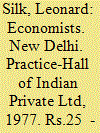

|
|
|
|
|
| Publication |
New Delhi, Practice-Hall of Indian Private Ltd, 1977.
|
| Description |
xii, 294p.Hbk
|
|
|
|
|
|
|
|
|
|
|
|
Copies: C:1/I:0,R:0,Q:0
Circulation
| Accession# | Call# | Current Location | Status | Policy | Location |
| 017467 | 923.3/SIL 017467 | Main | On Shelf | General | |
|
|
|
|
| 2 |
ID:
102906
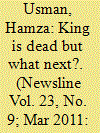

|
|
|
| 3 |
ID:
031405
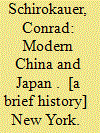

|
|
|
|
|
| Publication |
New York, Harcourt Brace Jovanovich, Inc., 1982.
|
| Description |
xix, 358p.pbk
|
| Standard Number |
0155598708
|
|
|
|
|
|
|
|
|
|
|
|
Copies: C:1/I:0,R:0,Q:0
Circulation
| Accession# | Call# | Current Location | Status | Policy | Location |
| 021623 | 951/SCH 021623 | Main | On Shelf | General | |
|
|
|
|
| 4 |
ID:
179767
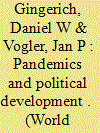

|
|
|
|
|
| Summary/Abstract |
Do pandemics have lasting consequences for political behavior? The authors address this question by examining the consequences of the deadliest pandemic of the last millennium: the Black Death (1347–1351). They claim that pandemics can influence politics in the long run if the loss of life is high enough to increase the price of labor relative to other factors of production. When this occurs, labor-repressive regimes, such as serfdom, become untenable, which ultimately leads to the development of proto-democratic institutions and associated political cultures that shape modalities of political engagement for generations. The authors test their theory by tracing the consequences of the Black Death in German-speaking Central Europe. They find that areas hit hardest by that pandemic were more likely to adopt inclusive political institutions and equitable land ownership patterns, to exhibit electoral behavior indicating independence from landed elite influence during the transition to mass politics, and to have significantly lower vote shares for Hitler’s National Socialist Party in the Weimar Republic’s fateful 1930 and July 1932 elections.
|
|
|
|
|
|
|
|
|
|
|
|
|
|
|
|
| 5 |
ID:
101920
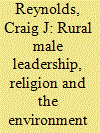

|
|
|
|
|
| Publication |
2011.
|
| Summary/Abstract |
By considering the historical significance of a southern Thai policeman, Khun Phantharakratchadet (1898-2006), I aim to shift historical writing away from the court, the aristocracy and the capital even though the social setting is not merely 'local' or 'peripheral' but an amalgam of elements found throughout the country. I also want to give credit to local historians often dismissed for being parochial, untheoretical and disposed to myth-making, and to show how tantric practices (saiyasat), the arts of self-defence, policing, banditry and masculinity intersect in the career of this policeman, a native of the unique environment in the Songkhla lakes district.
|
|
|
|
|
|
|
|
|
|
|
|
|
|
|
|
| 6 |
ID:
039049
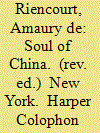

|
|
|
|
|
| Edition |
rev. ed.
|
| Publication |
New York, Harper Colophon Books, 1965.
|
| Description |
308p.pbk
|
|
|
|
|
|
|
|
|
|
|
|
Copies: C:1/I:0,R:0,Q:0
Circulation
| Accession# | Call# | Current Location | Status | Policy | Location |
| 002706 | 951/RIE 002706 | Main | On Shelf | General | |
|
|
|
|